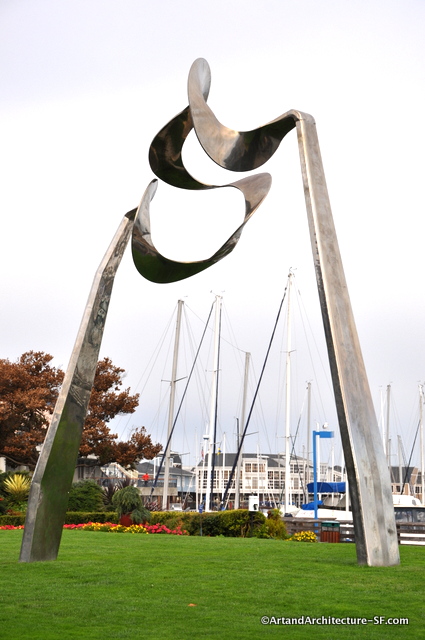This is not the first time, and I am sadly sure, it will not be the last, when researching an artist I find the information in their obituary. The San Francisco Chronicle carried Roger Barr’s obituary on January 14, 2000 and it was so eloquent I will simply repost it here.
Roger Barr, a prominent sculptor among whose works is “Skygate,” the first piece of public art along San Francisco’s Embarcadero, died Friday in a hospital in Joshua Tree from complications of diabetes.
Mr. Barr had lived in Santa Rosa for 25 years. His works are in the collections of many museums, including the Smithsonian Institution in Washington, the Museum of Fine Arts in Boston, the Natural Art Museum in Goteborg, Sweden, the San Francisco Museum of Modern Art and the Museum of Fine Art in Sao Paolo, Brazil.
Erected in 1985 as San Francisco’s first piece of public art financed by a corporation, the 26-foot-high Skygate is an arch-shaped structure near Pier 35 that was dedicated to longshoreman-philosopher Eric Hoffer.
At its dedication, Hoffer’s friend, journalist Eric Sevareid, praised the work a “shining link between sea and sky.”
Mr. Barr was born Sept. 17, 1921, in Milwaukee and studied and taught art in Wisconsin, New Mexico, Los Angeles, Paris, San Francisco, Hayward and Santa Rosa.
He was a Navy flier during World War II, spending part of the war as the flight deck officer of the USS Fanshaw.
After the war, he studied and taught art in Los Angeles, then Paris. He was a professor of art at American College in Paris in the early 1960s.
He returned to the United States in 1969. His third marriage in 1971 was to painter and printmaker Elizabeth Quandt. The couple traveled together in England, France and Japan.
Eric Hoffer was a fascinating man as well. An American social writer he authored ten books and was awarded the Presidential Medal of Freedom. His first book, The True Believer, published in 1951, was widely recognized as a classic, although Hoffer believed that his book The Ordeal of Change was his finest work.
